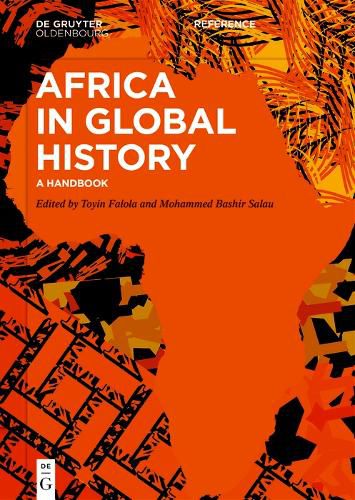Readings Newsletter
Become a Readings Member to make your shopping experience even easier.
Sign in or sign up for free!
You’re not far away from qualifying for FREE standard shipping within Australia
You’ve qualified for FREE standard shipping within Australia
The cart is loading…






This title is printed to order. This book may have been self-published. If so, we cannot guarantee the quality of the content. In the main most books will have gone through the editing process however some may not. We therefore suggest that you be aware of this before ordering this book. If in doubt check either the author or publisher’s details as we are unable to accept any returns unless they are faulty. Please contact us if you have any questions.
This handbook places emphasis on modern/contemporary times, and offers relevant sophisticated and comprehensive overviews. It aims to emphasize the religious, economic, political, cultural and social connections between Africa and the rest of the world and features comparisons as well as an interdisciplinary approach in order to examine the place of Africa in global history.
This book makes an important contribution to the discussion on the place of Africa in the world and of the world in Africa. An outstanding work of scholarship, it powerfully demonstrates that Africa is not marginal to global concerns. Its labor and resources have made our world, and the continent deserves our respect. - Mukhtar Umar Bunza, Professor of Social History, Usmanu Danfodiyo University, Sokoto, and Commissioner for Higher Education, Kebbi State, Nigeria
This is a deep plunge into the critical place of Africa in global history. The handbook blends a rich set of important tapestries and analysis of the conceptual framework of African diaspora histories, imperialism and globalization. By foregrounding the authentic voices of African interpreters of transnational interactions and exchanges, the Handbook demonstrates a genuine commitment to the promotion of decolonized and indigenous knowledge on African continent and its peoples. - Samuel Oloruntoba, Visiting Research Professor, Institute of African Studies, Carleton University
$9.00 standard shipping within Australia
FREE standard shipping within Australia for orders over $100.00
Express & International shipping calculated at checkout
This title is printed to order. This book may have been self-published. If so, we cannot guarantee the quality of the content. In the main most books will have gone through the editing process however some may not. We therefore suggest that you be aware of this before ordering this book. If in doubt check either the author or publisher’s details as we are unable to accept any returns unless they are faulty. Please contact us if you have any questions.
This handbook places emphasis on modern/contemporary times, and offers relevant sophisticated and comprehensive overviews. It aims to emphasize the religious, economic, political, cultural and social connections between Africa and the rest of the world and features comparisons as well as an interdisciplinary approach in order to examine the place of Africa in global history.
This book makes an important contribution to the discussion on the place of Africa in the world and of the world in Africa. An outstanding work of scholarship, it powerfully demonstrates that Africa is not marginal to global concerns. Its labor and resources have made our world, and the continent deserves our respect. - Mukhtar Umar Bunza, Professor of Social History, Usmanu Danfodiyo University, Sokoto, and Commissioner for Higher Education, Kebbi State, Nigeria
This is a deep plunge into the critical place of Africa in global history. The handbook blends a rich set of important tapestries and analysis of the conceptual framework of African diaspora histories, imperialism and globalization. By foregrounding the authentic voices of African interpreters of transnational interactions and exchanges, the Handbook demonstrates a genuine commitment to the promotion of decolonized and indigenous knowledge on African continent and its peoples. - Samuel Oloruntoba, Visiting Research Professor, Institute of African Studies, Carleton University